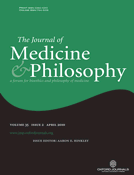-
Views
-
Cite
Cite
Brent M. Kious, Genetic Nondiscrimination and Health Care as an Entitlement, The Journal of Medicine and Philosophy: A Forum for Bioethics and Philosophy of Medicine, Volume 35, Issue 2, April 2010, Pages 86–100, https://doi.org/10.1093/jmp/jhq005
Close - Share Icon Share
Abstract
The Genetic Information Nondiscrimination Act of 2008 prohibits most forms of discrimination on the basis of genetic information in health insurance and employment. The findings cited as justification for the act, the almost universal political support for it, and much of the scholarly literature about genetic discrimination, all betray a confusion about what is really at issue. They imply that genetic discrimination is wrong mainly because of genetic exceptionalism: because some special feature of genetic information makes discrimination on the basis thereof wrong. I suggest, to the contrary, that the best arguments against genetic discrimination assume that health care is an entitlement. I do this by examining two different exceptionalist arguments for genetic nondiscrimination, showing that they do not furnish good reasons for prohibiting genetic discrimination unless one supposes that health care is an entitlement.



